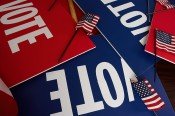Nearly 40 percent of African American voters are unsure how they feel about a voter-identification initiative on the 2011 statewide ballot, a new poll shows. Speaking at Koinonia Coffee House's Friday Forum this morning, pollsters Pam Shaw and Brad Chism said that one of the more surprising findings from a series of polls they conducted in the first quarter of 2011 was the high degree of uncertainty about voter ID among younger African Americans.
Respondents older than 55 were overwhelmingly opposed to implementing a statewide voter ID requirement, perhaps because of their familiarity with overt voter discrimination in earlier decades, Chism said. That certainty disappeared among younger cohorts, though.
"The next generation's a bit more mixed," Chism said. "There's a huge age difference in that area."
Overall, 38 percent of AfricanAmericans are unsure of their position on the ballot initiative. The percentage of those opposed to voter ID has increased since late winter, however, from 6 percent to 29 percent.
Chism and Shaw shared aggregate results from a series of six telephone polls conducted between Jan. 17 and March 28. The poll, a project of Chism and Shaw's joint venture, Perspective LLC, reached a total of 600 African American voters in all four of the state's congressional districts and had a margin of error of 4 percent. Shaw said that the poll provided an opportunity for "brutally honest conversations" about the diversity of views within the African-American population, which many political analysts and pollsters tend to ignore or view as monolithic.
Shaw added that she was surprised at the degree of optimism among African American voters in the state. A consistent majority of respondents said that they believed Mississippi's best days were ahead and that their own personal financial situation would be better in the future.
"Do folks not know what I know?" Shaw said she initially wondered. She decided that "it's a cultural thing: As bad as things are, (we believe) they're got to get better."
Shaw and Chism also found a strong consensus on some budget issues. A combined 74 percent of respondents said that the state's top budget priority should be K-12 education or Medicaid, with 39 percent picking K-12 education and 35 percent selecting Medicaid. A slight plurality of 35 percent said that the state should use a combination of spending cuts, tax increases and reserve funds to fix the state budget.
Chism said that he expects some diversity of opinion, among AfricanAmerican voters, based on geography, education and income, but that he and Shaw were not able to analyze their data at those levels.



Comments
Use the comment form below to begin a discussion about this content.